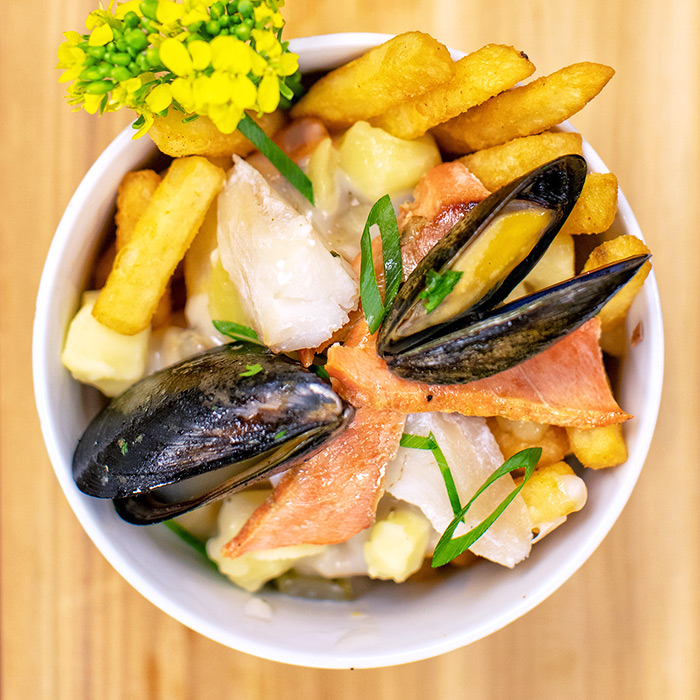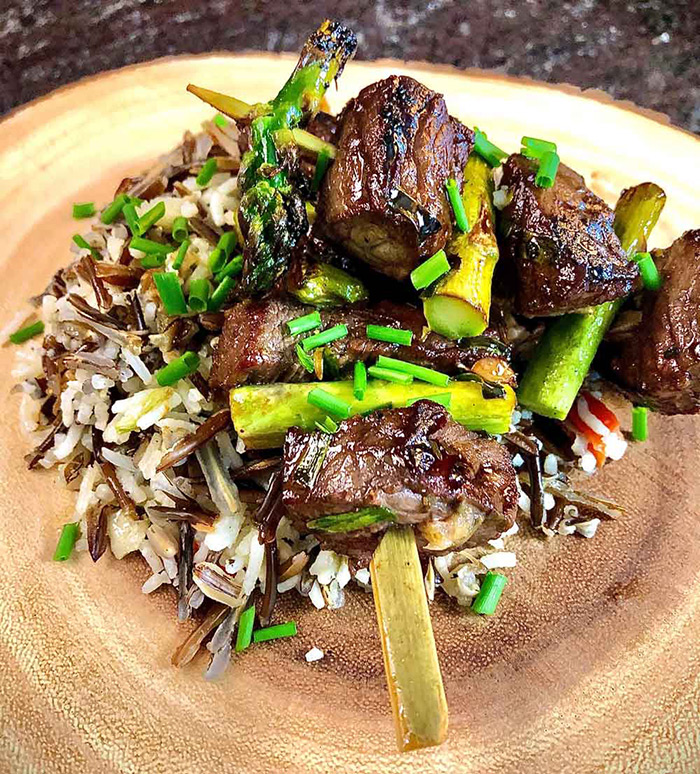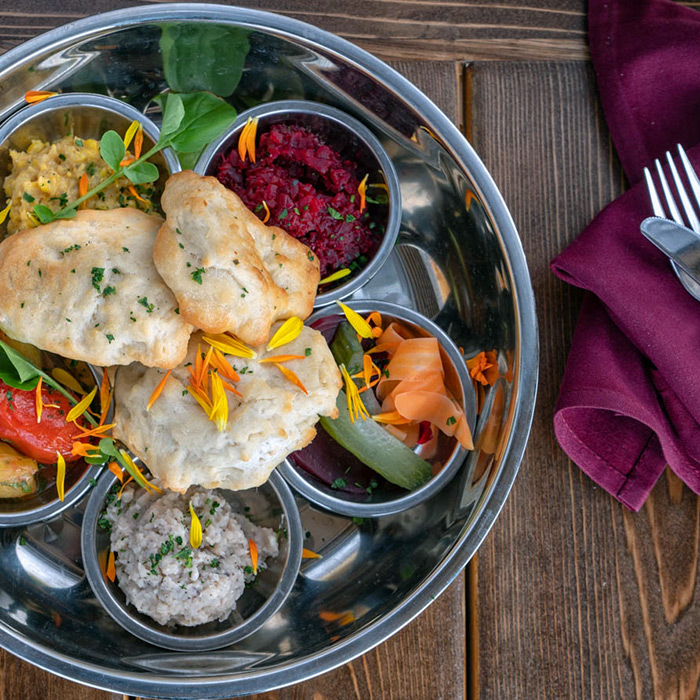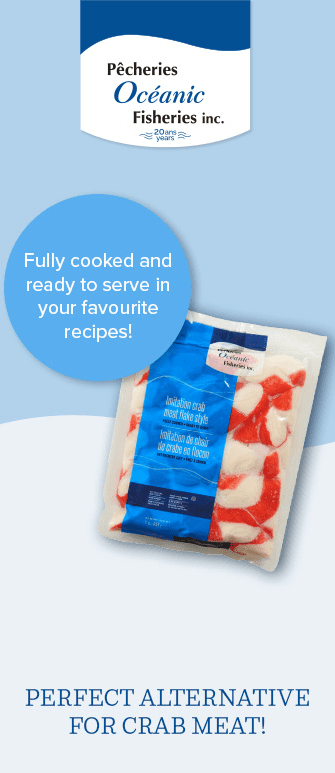As a little girl on the Blood Reserve in southern Alberta, Shantel Tallow watched her elders prepare food the traditional Blackfoot way from what they had hunted and gathered. “Those lessons of respecting the ingredients and appreciating the food are in me,” she says. “Those lessons helped me become who I am today.”
Tallow and her partner Paul Conley are part of a new generation of Indigenous cooks determined to preserve and share the food culture of their ancestors. Their Calgary-based venture, Aahksoyo’p Indigenous Comfort Food, is rising at a time Canada is trying to reconcile with its uneasy colonial past, and as Canadians are discovering a renewed appreciation of First Nations culture and food. (Aahksoyo’p means “we’re going to eat” in Blackfoot.)
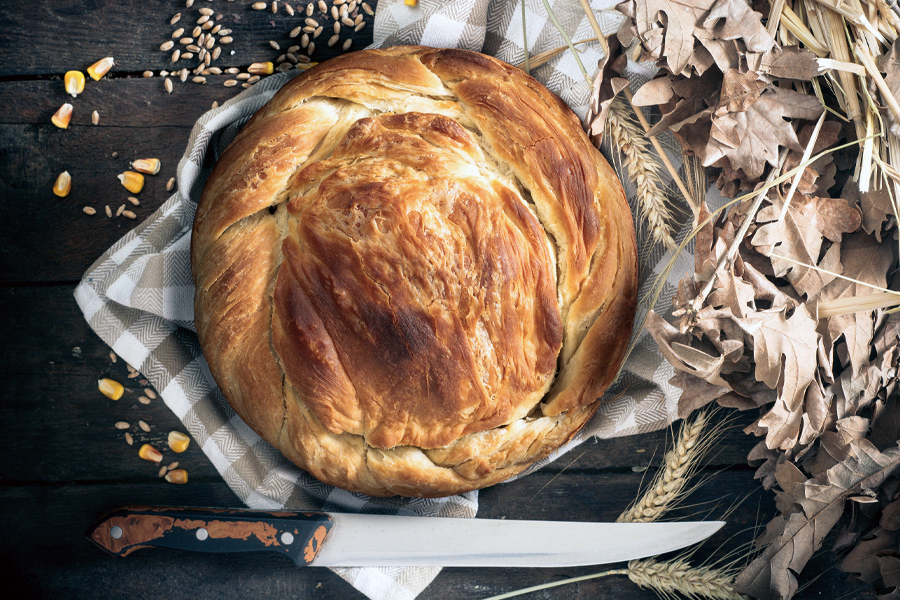
Bannock — a quick bread of flour, baking powder and water — is among the most recognizable Indigenous dishes.
Bannock — a quick bread of flour, baking powder and water fried on the stove top, baked in the oven or rotated on a stick over an open fire — is among the most recognizable Indigenous dishes. Just as her grandfather did, Tallow bakes the mixture and flips it to make it crispy on both sides.
She dries beef flank and makes it into pemmican — a lush mixture of the meat, Saskatoon berries (sometimes cranberries) and fat. It’s a four-day process that begins with slicing meat and then smoking it for two days and another day of open drying.
“I started this because I wanted the comfort food that I grew up on. For me, that is what my grandma and grandpa made. Dishes like hamburger gravy, potatoes and bannock. Simple and so good.”
Indigenous street food
Vancouver’s first Indigenous food truck, Mr. Bannock, opened early in 2018, with creations from Squamish Nation chef and owner Paul Natrall and his team. Their truck and catering menus include a range of bannock-based dishes, a BBQ salmon burger, and house-made tacos made with chili.
Chef Natrall calls it “Indigenous street food. We’re focusing on traditional foods and cooking methods and mixing it with other cuisines. We love being creative to see what we can make with what’s fresh and available.”
Wherever Chef Natrall would use other breads, he uses bannock instead. “It’s so versatile.” Their waffle bannock is a pan bread baked in a waffle press, not fried.
It’s all served up from a bright red and white truck designed by Heiltsuk artist KC Hall featuring berries, squash corn and beans. “There’s a lot of support and interest for what we are doing, and the media coverage has been a real boost,” he says.
A taste for tradition
Indigenous eateries are popping up all over Canada, with a range of food trucks, catering businesses and sit-down eateries. Indigenous cuisine hits two major food trends, Technomic reports. It fits demand for ethnic foods and answers consumer interest in local and domestic ingredients.
“Concepts dedicated entirely to authentic Indigenous ingredients and preparations will continue to emerge as diners’ interest in First Nation cuisines grows,” Technomic predicts. Many of the ingredients, long valued by Indigenous people, are now being discovered by a new generation of chefs who employ modern techniques and are bringing new ideas to their plates. They are leading the way in a revival of long-neglected culinary traditions and a reawakening of our collective history.
Basics with flair
Working with Songhees Nation members, Songhees Seafood & Steam Executive Chef David Roger built a menu with fresh local ingredients that authentically incorporates the craft of traditional recipes with the flair of modern techniques. “It’s simple cooking, back to the basics, with a twist,” he says. “Lots of marinade, lots of smoking, fresh and local ingredients, prepared with an eye on seasonality.”
Their menu, served from a food truck on the Songhees Nation just outside downtown Victoria and during catered events, includes smoked brisket poutine, caribou pot pies, venison sausage rolls, bison burgers, salmon salad, and bannock and jam. They use foraged ingredients as much as possible, too, like stinging nettles from their rooftop garden.
What is Indigenous food?
It’s a broad range of foods reflecting ingredients harvested and prepared by Canada’s First Nations peoples — from salmon on the coast to bison on the plains. Traditional Indigenous cuisine is based on living in balance with our surroundings, giving back to the earth, respecting life, and no-waste head-to-tail cooking.
What are considered Indigenous ingredients and dishes?
Game meats, fish and seafood, fruits, berries, mushrooms, herbs and flowers hunted, fished and foraged locally. (In most provinces meat that has been hunted cannot be served to patrons, meaning wild game such as moose — a staple in many Indigenous communities — cannot be served in restaurants.)
Popular dishes include bannock (bread), pemmican (a concentrated mixture of meat, fat and berries), Ojibwe wild rice, salmon chowder, venison chili, Nehiyaw tacos and bison pot pie, to name a few.
How can operators incorporate Indigenous dishes into their menus?
Start basic with items like bannock and Saskatoon jam, and put them in a basket and onto the table as starters, recommends Chef Shantel Tallow. A berry soup, using seasonal Saskatoon berries, is an easy mixture of water, berries, sugar and a little flour to thicken. “It is good hot or cold, and it’s a great detoxifier.”
Going fresh, local, inspired
- Respect the traditional way of hunting and gathering with local sourcing of ingredients. Pay attention to seasonality.
- Swap ingredients such as cheese and wheat flour with beans, corn and squash.
- Practise sustainable food culture and reduce waste by utilizing the entire animal.
- Get playful and have fun. Tempt customers with modern fusion creations that combine traditional ingredients and world culinary tastes.

